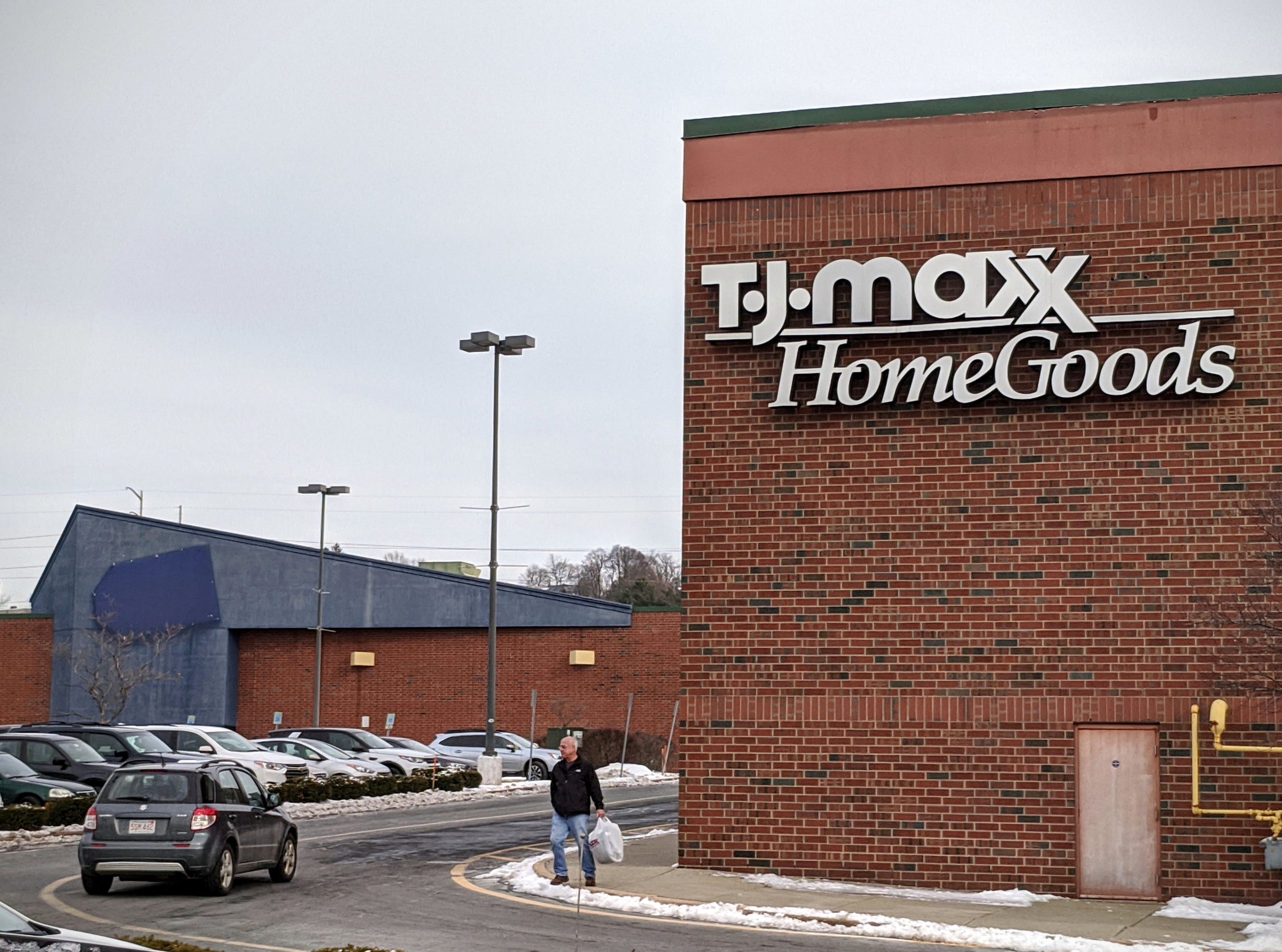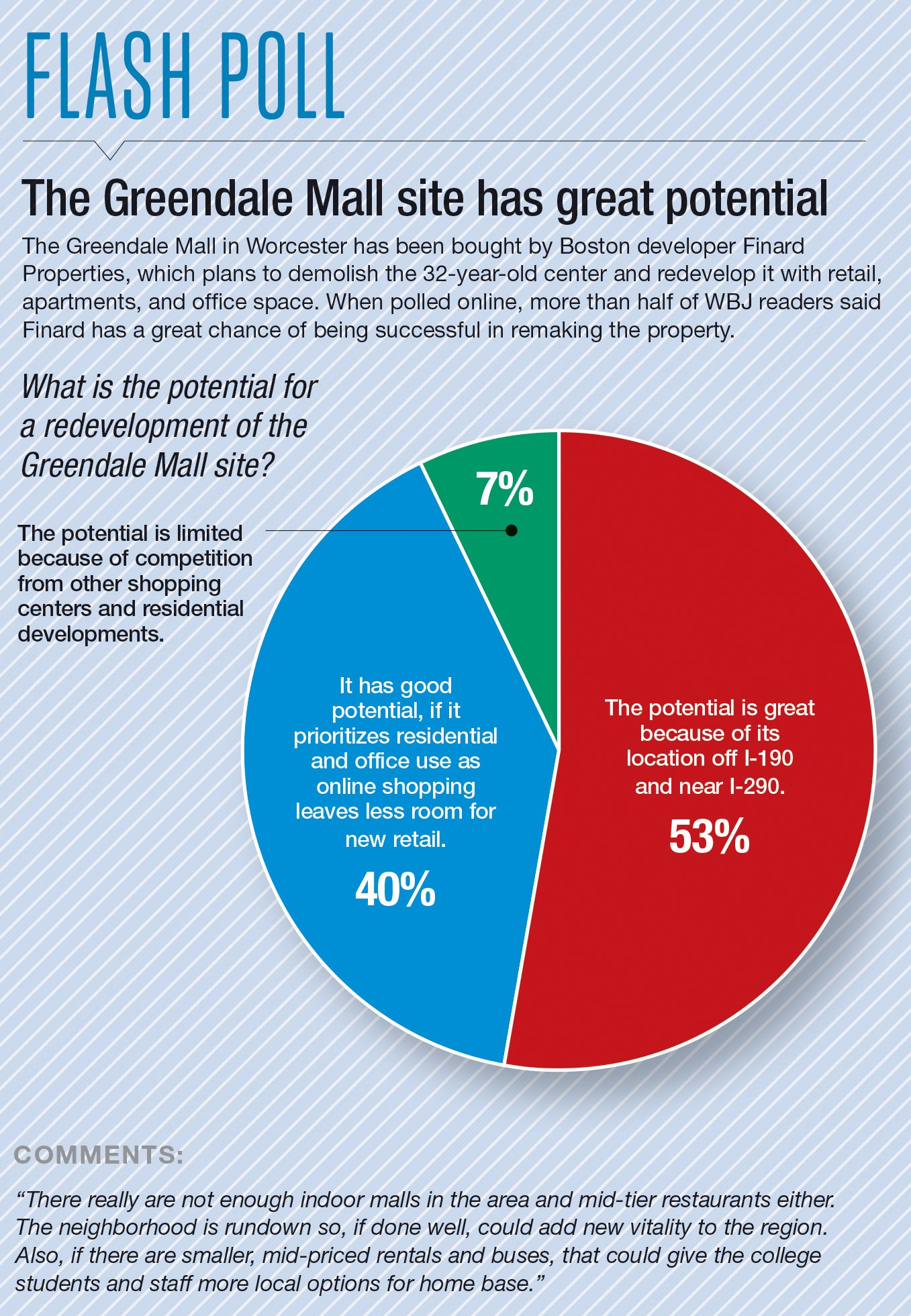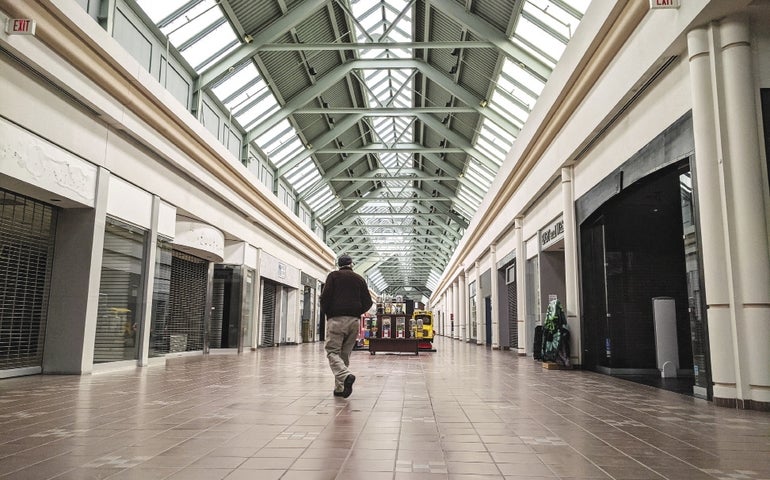Finard Properties’ purchase of the failing Greendale Mall in Worcester for a bargain price in December signals the death of another covered shopping center in Massachusetts.
Get Instant Access to This Article
Subscribe to Worcester Business Journal and get immediate access to all of our subscriber-only content and much more.
- Critical Central Massachusetts business news updated daily.
- Immediate access to all subscriber-only content on our website.
- Bi-weekly print or digital editions of our award-winning publication.
- Special bonus issues like the WBJ Book of Lists.
- Exclusive ticket prize draws for our in-person events.
Click here to purchase a paywall bypass link for this article.
Boston developer Finard Properties’ purchase of the failing Greendale Mall in Worcester for a bargain price in December signals the death of another covered shopping center in Massachusetts.
Within a day of the $7.1-million closing, CEO Todd Finard told WBJ he plans to demolish the 33-year-old property to make way for a lifestyle center featuring shops, restaurants, medical offices, and apartments.
If Finard wins approval to redevelop the 22-acre site at the intersection of Interstates 290 and 190, it will be the latest effort to reimagine an underperforming mall.
“The era of enclosed shopping centers has passed,” Finard said. “Shoppers have embraced places like Northborough Crossing and MarketStreet in Lynnfield with its apartments, health clinic, medical offices, and retail.”
The number of lifestyle centers, sometimes called open-air malls, have more than tripled since the 2000s, according to the International Council of Shopping Centers. The latest count by the New York-based trade association put the number at 530.
The changing face of Massachusetts malls
In Watertown, the former Arsenal Mall is in the midst of becoming Arsenal Yards, a $400-million mixed-use destination on the city’s east side. When completed, the 1-million-square-foot neighborhood will include more than 50 shops, restaurants and fitness centers anchored by a Roche Bros. supermarket, a seven-screen movie theater, and life science space.
Built above Marshalls, the 108,000-square-foot offices have been leased. Most if it by SQZ Biotechnologies, a privately-held cell therapy company, who moved in during December. Two other tenants are scheduled to occupy the space later this year.
There’s a 150-room Hampton Inn & Suites by Hilton, and three apartment buildings with 300 studio, one-, two-, and three-bedroom units offering a roof deck and fitness center.
The first tenants are slated to move in by December while the others will be available in 2021.

Like Greendale, the Arsenal Mall opened in the 1980s. The Watertown stores were enclosed in two historic buildings serving as an arms and ammunition complex during the Civil War, and World Wars I and II.
Boylston Properties and the Wilder Cos., both of Boston, bought the mall and the adjacent Harvard Vanguard Medical Associates building in 2013 for $80.5 million.
William McQuillan, Boylston’s president, said while the two historic buildings have been preserved, the single-story stores built in the 1980s have been demolished to make way for new construction.
“The idea of doing a lifestyle center evolved as we saw what was going on in the retail sector,” McQuillan said. “We were also influenced by the 600 apartments that were built one-half mile away.”
On Arsenal Street, the Elan Union Market complex contains 300 units, and there’s another 300 apartments at Gables Arsenal Street.
“We are simply supplying young professionals who work in tech and bio and earn as much as $125,000 with what they’re looking for: Better places to live, shop, and dine,” said McQuillan. “It’s not rocket science. We are filling the space with the things that make sense. We are following the marketplace.”
Last summer, 10 miles north in Woburn, the city council approved a special permit to redevelop the Woburn Mall. In its place on the 23-acre site will stand Woburn Village.
Edens, a South Carolina-based developer, bought the Woburn Mall for $44 million in 2019.
The company said a reconstituted mall would be in the best position to compete with the Burlington Mall and MarketStreet in Lynnfield.
The 244,000-square-foot shopping center has been demolished to make way for a sprawling mixed-use redevelopment featuring new shops, a cinema, and 350 apartments.

An example for the new Greendale
Finard said the revived Greendale Mall will take a page out of MarketStreet Lynnfield’s success.
Newton developers National Development and WS Development collaborated to build the $110-million open-air mall on the former Colonial Golf Course in 2013 off Route 128.
It features more than 80 shops and restaurants totaling 395,000 square feet of retail space, 80,000 square feet of office, 180 luxury apartments, and the King Rail Reserve golf course.
“The enclosed mall has just not succeeded over time,” said Ted Tye, managing partner at National Development.
Providing a short history of retail, Tye said its progression started out with strip malls.
Typically, they featured a supermarket on one end or a Bradlees, Zayre, or J.M. Fields at the other. Those three retailers went out of business. Then the enclosed mall was born. But they too relied on anchors such as Filene’s, Sears, and J.C. Penney, and they are all either gone or in a downturn.
“Malls are very expensive to build and very expensive to operate,” he said. “It’s a big building that must be heated, cooled and lit, so tenants can get into a lifestyle center at a lower cost.”
Still, Tye acknowledged given New England’s often severe winters, the idea of open air malls are counterintuitive.
“But not every trip to go shopping involves a three-hour tour,” he said. “The fact that someone can drive, park, and walk to their destination isn’t a deterrent.”
The other advantage lifestyle centers have over that traditional malls, he said, is open space.
MarketStreet offers ice skating while others offer outdoor movies, fitness sessions, and activities for kids like face painting.
Jon Hurst, president of Retailers Association of Massachusetts, acknowledged plenty of malls need to be repurposed.
But Hurst said enclosed malls will not disappear, as they are changing to meet demand.
For example, the North Shore Mall, which suffered a blow when the Apple store moved to MarketStreet, will see a 114,000-square-foot athletic lifestyle resort open later this year. The Simon Property Group, the nation’s largest retail real estate investment trust and owner of the Peabody mall, is building a three-story Life Time fitness facility to include outdoor lap and leisure pools, whirlpools, and a bistro.
In addition, Simon’s Burlington Mall is underway with its own lifestyle center to replace the Sears automotive center. The new 35,000 square-foot, single-story, retail and restaurant building will connect to the mall.
At the Natick Mall, JC Penney was replaced with Wegmans. The New York supermarket chain created a two-floor, 146,500-square-foot supermarket with more than 100 seats for café dining and two restaurants.
The store features escalators for shoppers and carts as well as elevators to help customers move between the supermarket’s floors.
“The idea of lifestyle centers is a good one, people like it, and recalls traditional downtown from years gone by,” Hurst said. “But malls are reinventing themselves. There will be fewer and smaller stores, entertainment, and even healthcare services. It’s almost a return to yesteryear.”

